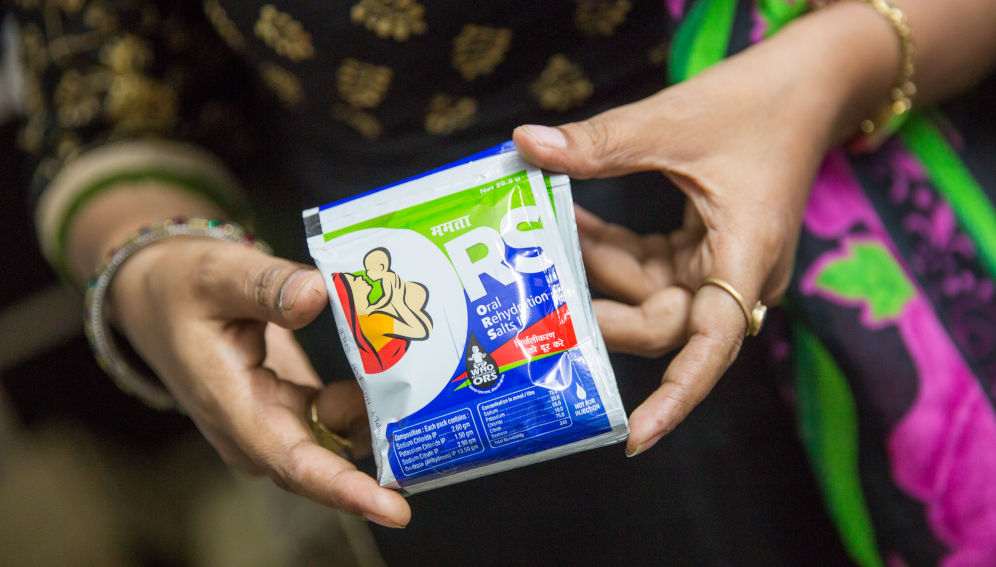23/02/24
Study finds cause of puzzling low use of diarrhoea cure

By: Claudia Caruana
Send to a friend
The details you provide on this page will not be used to send unsolicited email, and will not be sold to a 3rd party. See privacy policy.
[NEW YORK] Young children in India who suffer from life-threatening diarrhoea frequently are given ineffective treatments because health providers misperceive the wishes of parents, an international study shows.
Diarrhoea is the second leading cause of death for children under the age of five worldwide, despite the fact nearly all such deaths could be prevented with oral rehydration salts (ORS) – a small package of electrolytes mixed with water before drinking.
Although the benefits of ORS have long been known, they have been underused for decades, according to the study published in Science this month. It found that, at present, nearly half of diarrhoea cases around the world do not receive ORS treatment.
“Despite decades of widespread knowledge that ORS is a lifesaving intervention that can save lives of children suffering from diarrhoea, the rates of ORS use remain stubbornly low in many countries such as India,” says co-author Manoj Mohanan, professor and senior associate dean at Sanford School of Public Policy, Duke University, in the US.
Scoping the problem
The researchers sent standardised patients – actors trained to present as patients – to make unannounced visits to health care facilities and present a case of diarrhoea for their two-year-old child.
They randomly assigned the patient to express a preference for ORS, antibiotics, or no preference.
This meant they could find out whether prescribers followed the wishes of parents who requested antibiotics. Such a scenario could be problematic especially if the prescriber suspected the child had diarrhoea caused by a virus and not by bacteria as antibiotics are not helpful for viral-caused diarrhoea.
Additionally, they wanted to learn if the prescribers offered antibiotics over ORS because they were more profitable to prescribe due to financial incentives. So, they asked some of the ‘patients’ to tell providers that they would buy medicines somewhere else if they weren’t prescribed.
Finally, the researchers wanted to find out if there were sufficient dosages of ORS available at health facilities. For this, providers in half of the 253 towns where the study was conducted received a six-week supply of ORS.
According to the researchers, health care providers’ perception that patients do not want ORS accounted for roughly 42 per cent of underprescribing, while stockouts and financial incentives explained only 6 per cent and 5 per cent, respectively.
They also found that where patients expressed a preference for ORS, prescribing of the treatment increased by 27 percentage points. Eliminating stockouts only increased ORS prescribing by 7 percentage points while removing financial incentives only increased ORS prescribing at pharmacies.
“As economists, we often think of financial incentives being a major factor in explaining [health care provider] behaviour,” Mohanan told SciDev.Net.
“In this sense, our finding that providers’ behaviour about ORS prescription is driven more by perceptions about what patients might want is a novel contribution to the literature and our understanding of the problem.”
Diarrhoeal disease is most acute in South Asia and Sub-Saharan Africa, due to shortages of adequate sanitation and hygiene and safe drinking water.
Neeraj Sood, co-author of the study and a professor at the University of Southern California Price School of Public Policy, said: “The study provides new insights that now allow us to pursue interventions that can address this problem.”
One suggested intervention is to target healthcare providers and encourage patients and practitioners to request ORS for diarrhoea.
The ‘know-do’ gap
Jishnu Das, a professor of public policy at Georgetown University, Washington, D.C., points out that in 2007, two papers published simultaneously from India and Tanzania showed that, in their clinical practice, doctors perform far below their knowledge frontiers.
“Many doctors who tell you that they would give ORS to a patient with diarrhoea, don’t do so in their clinical practice,” he explained.
This phenomenon – known as the “know-do” gap – is one of the biggest puzzles in global health today with fundamental consequences for population health, says Das.
“Many patients do not get the life-saving treatments they need, like ORS, despite going to the doctor and despite the doctor knowing what the right thing to do is.”
Das points out that although this research has firmly established the validity of the know-do gap, “the global health community still does not have a clear answer for what causes this gap. This new paper is important precisely because it demonstrates a key finding in an experimental manner.”
Ada Kwan, a postdoctoral scholar and health economist in the Department of Medicine at University of California, San Francisco tells SciDev.Net that the study “gives us a rich glimpse into what happens between health providers and patients”.
“Before, we could only guess why providers under prescribe ORS for childhood diarrhoea, despite ORS being an incredibly cost-effective and simple solution to a common set of symptoms that can easily have fatal outcomes,” she said.
From this research, Kwan notes, “we can see that the largest contributor of underprescribing ORS is that providers misperceive that patients do not want ORS.”
This piece was produced by SciDev.Net’s Asia & Pacific desk.













